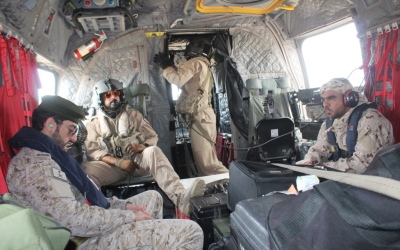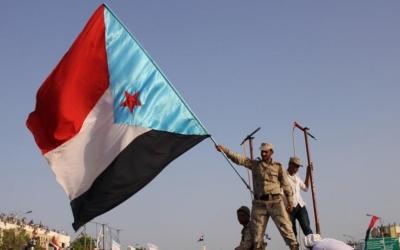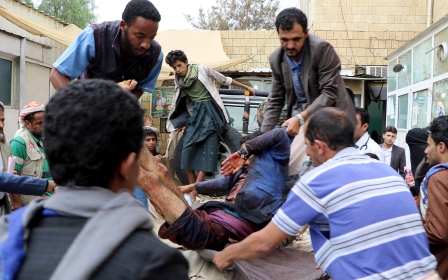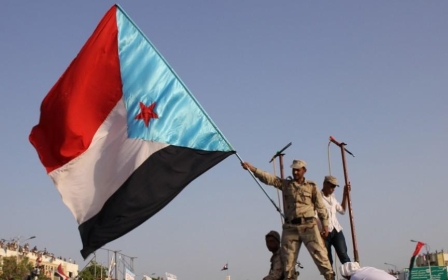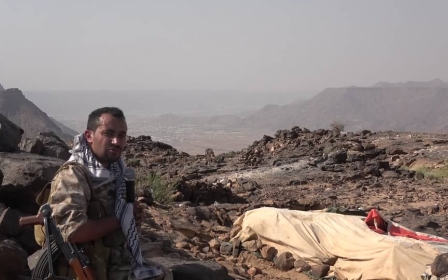Saudi envoy blames Iran for Houthi attack in Aden as dozens left dead
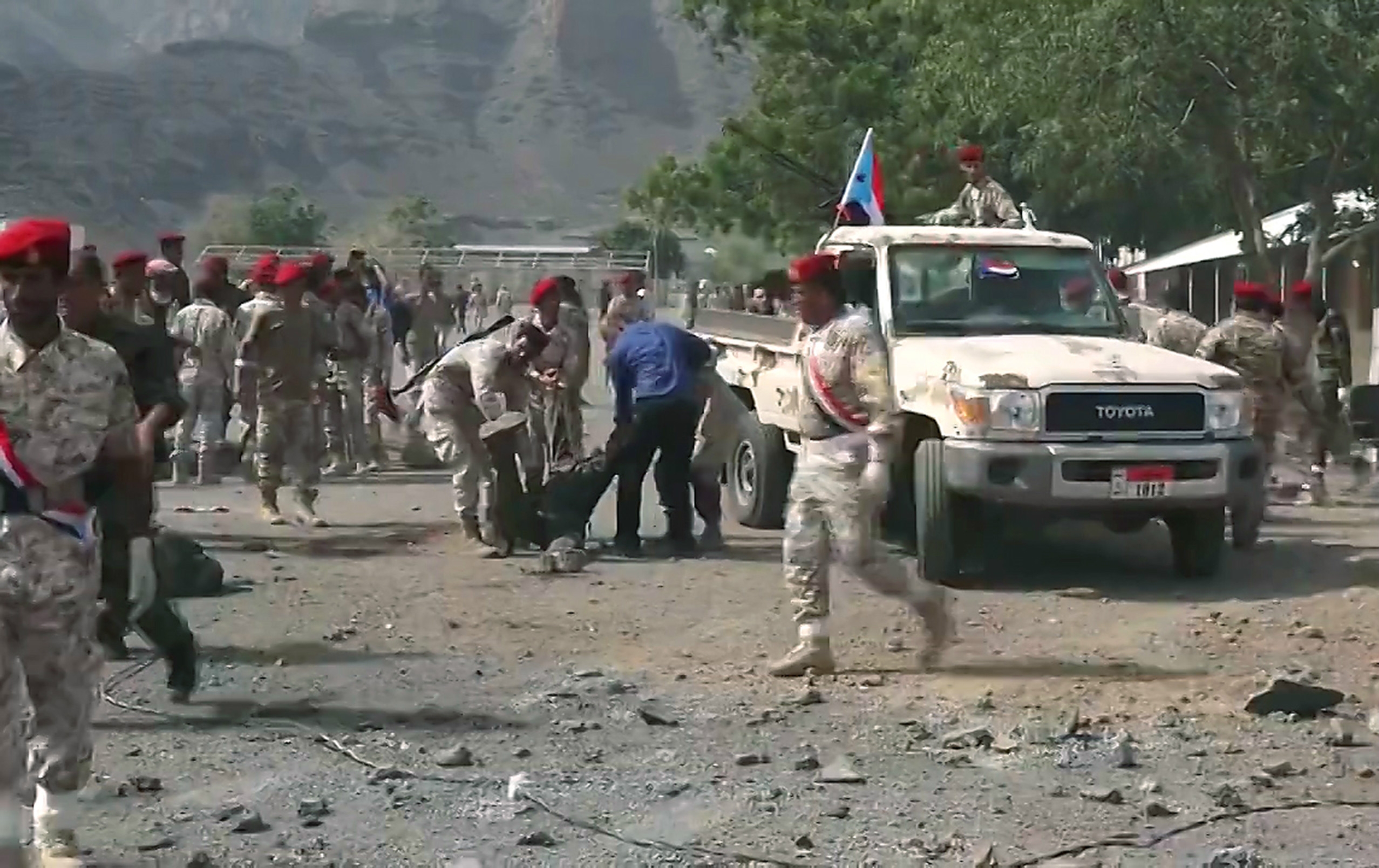
More than 30 people have been killed in an attack on a military parade near the southern Yemeni city of Aden, according to security and medical sources, with the Houthi rebels claiming responsibility.
The attack killed at least 36 people, including senior officers, according to the interior ministry.
Yemen's Prime Minister Maeen Abdulmalik Saeed and Saudi Arabia's envoy to Yemen, in separate tweets, accused Iran of being behind the attack along with a blast earlier on Thursday at a police station in the southern port city.
The Saudi envoy, Mohammed bin Saeed al-Jabir, said the attacks indicate that Iran "shares common goals with fellow terrorists such as Daesh (Islamic State) and al-Qaeda".
Iran, which has been accused of supporting the Houthis, denies having any involvement in Yemen.
New MEE newsletter: Jerusalem Dispatch
Sign up to get the latest insights and analysis on Israel-Palestine, alongside Turkey Unpacked and other MEE newsletters
A Reuters witness saw nine bodies on the ground after an explosion hit the military camp belonging to the so-called Security Belt forces backed by the United Arab Emirates (UAE), which is a member of the Saudi-led military coalition battling the Houthis.
The AFP news agency reported that 17 officers had been killed and that the attack had occurred at a parade in a police camp.
Soldiers screamed and ran to lift the wounded and place them on trucks, while red berets lay on the ground in pools of blood, Reuters said.
The Houthi's official channel al-Masirah TV said the group had launched a medium-range ballistic missile and an armed drone at the parade, which it described as being staged in preparation for a military move against provinces held by the movement.
A Houthi spokesperson told al-Masirah that the parade was targeted because "it was being used to prepare for a military advance on Taiz and Dalea".
Southern separatist commander killed
The interior ministry said Brigadier General Muneer al-Yafee, a leading figure of the southern separatists, was among those killed.
"The blast occurred behind the stand where the ceremony was taking place at Al Jalaa military camp in Buraiqa district in Aden," the Reuters witness said.
"A group of soldiers were crying over a body believed to be of the commander."
Yafee had just stepped off the stage to greet a guest when the explosion took place.
Flags of the former South Yemen and those of leading coalition members were fluttering as the military band was waiting for its cue to start playing.
Earlier on Thursday, a suicide car bomb attack targeted a police station in the Omar al-Mokhtar neighbourhood of Aden city.
No one has claimed responsibility for the other attack which the interior ministry statement said killed 13 policemen.
Local officials, who spoke on condition of anonymity, told the Associated Press news agency that the bomber drove his explosives-laden car into the police station's gates shortly after the morning police lineup.
It was not clear if the incidents were linked but previous car attacks have been carried out by al-Qaeda.
UAE withdrawal
The Western-backed coalition led by Saudi Arabia and the UAE intervened in Yemen in 2015 to try to restore the internationally recognised government ousted from power in the capital Sanaa by the Houthis in late 2014.
The government of Abd Rabbuh Mansour Hadi controls the southern port city of Aden.
The Houthi movement, which says its revolution is against corruption, holds Sanaa and most of the biggest urban centres in the Arabian Peninsula nation.
There was no immediate comment from the Yemeni government or the coalition on the attack, Reuters said.
Last month, the UAE said it was scaling down its presence in Yemen, pulling some troops from areas including Aden and the western coast deployed for operations against the Houthis in the main port city of Hodeidah, where a UN-brokered ceasefire has been in place since last December.
An Emirati official said the UAE would not leave a vacuum in Yemen as it had trained 90,000 Yemeni forces, drawn from among southern separatists, including Security Belt forces, and coastal plains fighters.
The coalition has come under pressure from Western allies, including countries that supply it with arms and intelligence, to end the war,
"The UAE's recent drawdown shuffled the deck in a way that opens new opportunities to de-escalate the conflict, but also brings new perils," said Elizabeth Dickinson of the International Crisis Group think tank.
"The Houthis may be trying to test how it will change conditions on the ground."
Missile attack on Saudi Arabia
The Houthis have stepped up cross-border missile and drone attacks on Saudi cities and the coalition has responded with air strikes on Houthi military sites, mostly around Sanaa.
Al-Masirah said the Houthis launched a long-range ballistic missile on an "important" military site in Dammam in Saudi Arabia's Eastern Province on Thursday.
The escalating violence could complicate UN-led efforts to implement a troop withdrawal in Hodeidah, the main entry point for Yemen's commercial and aid imports, to pave the way for political talks to end the war amid mistrust among all parties and competing agendas of Yemen's fractious groups.
The more than four-year conflict, widely seen in the region as a proxy war between Saudi Arabia and Iran, has killed tens of thousands and pushed Yemenis to the brink of famine.
Middle East Eye delivers independent and unrivalled coverage and analysis of the Middle East, North Africa and beyond. To learn more about republishing this content and the associated fees, please fill out this form. More about MEE can be found here.


